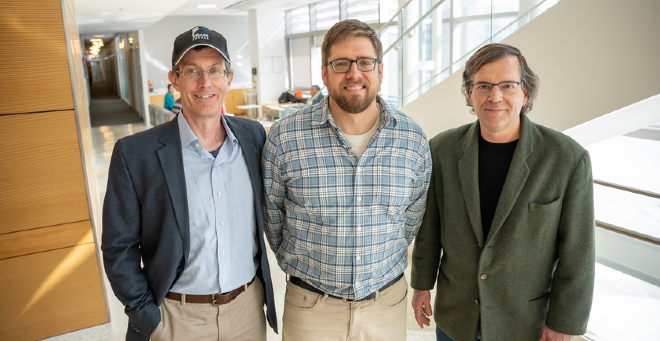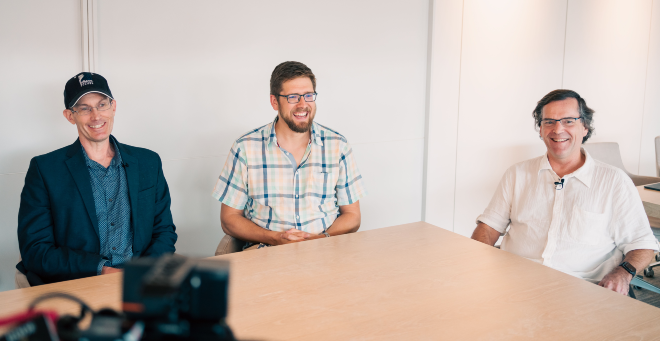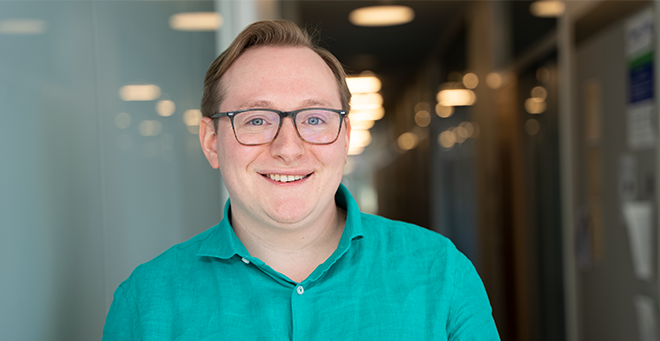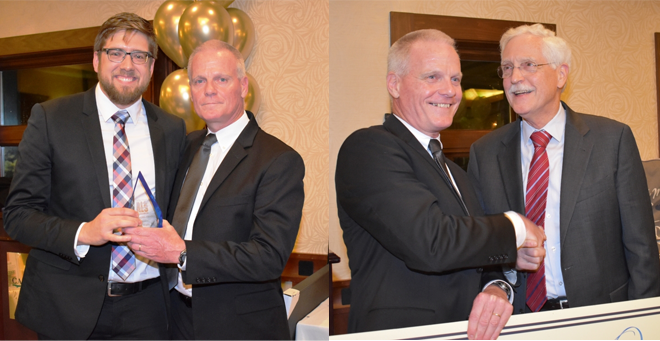
A collaborative effort between three scientists at UMass Chan Medical School is expected to help advance genome editing approaches for Rett syndrome, a neurological disease caused by mutations in a gene called MECP2, which is a master regulator of gene expression in the brain.
Erik Sontheimer, PhD, the Pillar Chair in Biomedical Research and professor of RNA therapeutics; Jonathan Watts, PhD, professor of RNA therapeutics; and Scot Wolfe, PhD, professor of molecular, cell & cancer biology, were awarded $2.3 million in new funding from the Rett Syndrome Research Trust to utilize base-editing and prime-editing technologies to correct mutations in MECP2.
“We are working on different aspects of genome editing systems for correction of mutations in the genome. For several years now, we’ve been working together on developing tools for correcting common mutations in Rett syndrome and then working to apply those tools using delivery systems to the central nervous system. This funding helps to continue to support those efforts,” Dr. Wolfe said.
“The editing approaches we’re working on have the chance to change disease outcomes even more profoundly, and perhaps enable patients to get much closer to normalcy.”
With the funding, the labs will utilize a base-editing approach to aggressively pursue specific mutations, in addition to exploring prime editing to study its potential to edit multiple mutations with a single therapeutic. Base editing is used to change the sequence of one site within a DNA molecule, while prime editing rewrites the genetic information of a longer DNA sequence.
“This award is an opportunity to target particular mutations in the Rett syndrome patient population. We want to apply genome editing tools, platforms and approaches to develop a deeper understanding of how they work and find out what’s effective,” Dr. Sontheimer said.
Rett syndrome is a rare genetic neurological disorder that occurs primarily in girls, eventually robbing them of the ability to speak, walk or use their hands, among other devastating effects. It occurs in about 1 in 10,000 girls and is typically diagnosed between the ages of 6 and 18 months.
Current treatments for Rett syndrome symptoms are palliative, but gene therapy clinical trials aimed at addressing the disease’s underlying causes are underway.
“I am cautiously optimistic there’s a good chance that these gene therapy approaches are going to be successful at making some difference. The editing approaches we’re working on have the chance to change disease outcomes even more profoundly, and perhaps enable patients to get much closer to normalcy, especially if the disease can be caught earlier,” Dr. Watts said.

The Sontheimer, Watts and Wolfe labs are also part of the newly created Rett Syndrome Research Trust Editing Consortium comprising a “core group of scientists” who will collaborate to advance genome editing.
“The trust is really taking an ‘all of the above’ type of approach to Rett syndrome, whether it be gene therapy, genome editing, transcriptome editing, among other things, and the whole idea is to share results, share approaches, share what we learn, share reagents, and make it move faster than any subset of groups can do on their own,” Sontheimer said.
The funding received by UMass Chan is part of $10.3 million in new grants awarded by the Rett Syndrome Research Trust in 2023.
“I’m so pleased to be able to put RSRT’s resources behind Erik, Jonathan, and Scot, leaders in their field who are advancing cutting edge editing technologies and applying them to Rett syndrome,” said Monica Coenraads, RSRT’s chief executive officer. “RSRT’s original funding enabled significant progress and I’m confident that the new award will accelerate that momentum. Unlike many scientific collaborations that are collaborative in name only, I know this UMass Chan team truly works together, enthusiastically sharing data and ideas to make the fastest advances possible. I’m looking forward to the exciting progress I know they’ll make over the next several years.”


